| Srl | Item |
| 1 |
ID:
098902
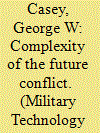

|
|
|
| 2 |
ID:
118216
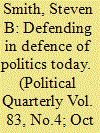

|
|
|
|
|
| Publication |
2012.
|
| Summary/Abstract |
What are the threats to politics fifty years after the publication of Bernard Crick's classic In Defence of Politics? The chief danger lies in the forces of globalisation and the eclipse of the national state as the locus of political life. It is the hope of many in both Europe and the US that we might replace the basic structure of the sovereign state with a variety of postnational forms of organisation such as the UN or the EU. What are the forces behind these developments? Are we entering a world beyond politics increasingly administered by international law courts and tribunals no longer responsible to their national electorates? The possibility cannot be ruled out, but such a world, I suggest, would no longer be a political world.
|
|
|
|
|
|
|
|
|
|
|
|
|
|
|
|
| 3 |
ID:
029878
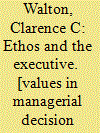

|
|
|
|
|
| Publication |
New Jersey, Prentice Hall, Inc., 1969.
|
| Description |
xiii, 267p.Hbk
|
| Standard Number |
132918153
|
|
|
|
|
|
|
|
|
|
|
|
Copies: C:1/I:0,R:0,Q:0
Circulation
| Accession# | Call# | Current Location | Status | Policy | Location |
| 004149 | 658.403/WAL 004149 | Main | On Shelf | General | |
|
|
|
|
| 4 |
ID:
096994
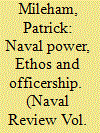

|
|
|
| 5 |
ID:
092929
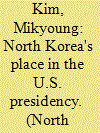

|
|
|
|
|
| Publication |
2009.
|
| Summary/Abstract |
Foreign policy behavior is a function of combined elements such as strategic calculations, institutionalized mechanisms, interactive constructed identity, and transaction/opportunity costs. The top leaders' connectivity serves as an intervening variable in the process. The personal connection, of course, cannot show the whole picture of behind-the-curtain dynamics, and yet it still is a piece of the puzzle in explaining "why it happened the way it happened." This article, an inductive analysis of narratives, explains why the current nuclear impasse emerged at the end of the Clinton administration and how the George W. Bush administration chose to dismiss the Kim Jong Il regime as a legitimate counterpart by focusing on cultural elements of the top leaders' ethos and worldviews.
|
|
|
|
|
|
|
|
|
|
|
|
|
|
|
|
| 6 |
ID:
092720
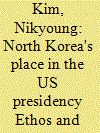

|
|
|
| 7 |
ID:
131334
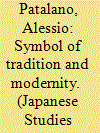

|
|
|
|
|
| Publication |
2014.
|
| Summary/Abstract |
In the literature on the Japanese postwar rearmament, the loss of credibility of the Imperial armed forces prompted the Japan Self-Defence Forces to distance themselves from that institutional lineage and to define and display their own image. Underpinning this was the notion that the Imperial Army and Navy were publicly regarded as organisations that could no longer offer relevant professional models. This article reviews that assumption, investigating the early postwar naval narrative as it became popularised by journalist and historian It? Masanori. It suggests that the postwar rejection of the imperial military past did not affect the Imperial Army and Navy equally. The reputation of the Imperial Navy as a professional organisation was not eradicated from postwar public memory. A distinguished correspondent and an internationally renowned writer, It? dedicated his work to shape the early postwar naval narrative, defining the virtues that made the navy a symbol of the nation's own journey into modernity. In so doing, he joined the public debate on rearmament and argued for the standards of the Imperial Navy to find their way into the professional ethos of the new armed forces
|
|
|
|
|
|
|
|
|
|
|
|
|
|
|
|